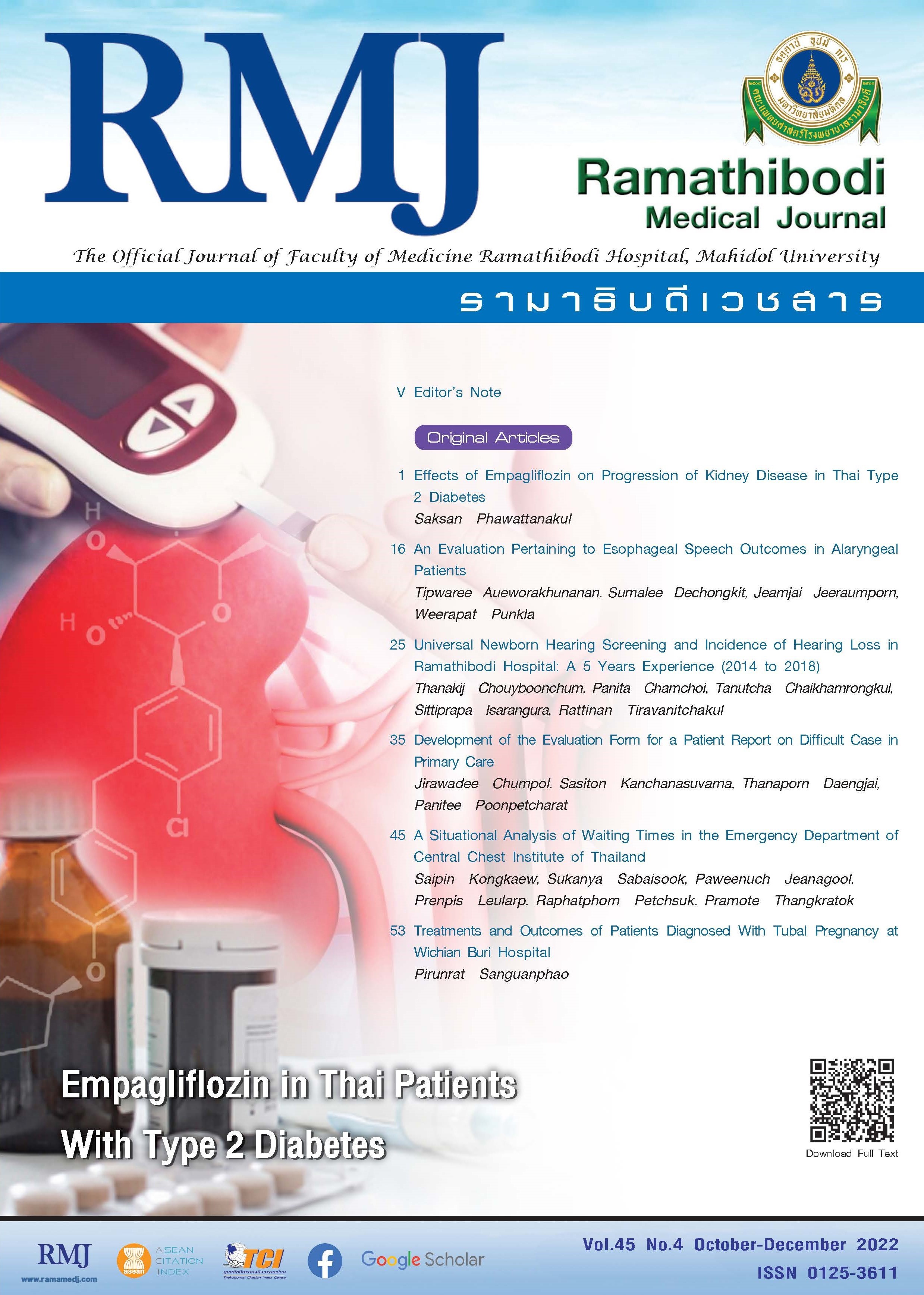Treatments and Outcomes of Patients Diagnosed With Tubal Pregnancy at Wichian Buri Hospital
DOI:
https://doi.org/10.33165/rmj.2022.45.4.259482Keywords:
Tubal pregnancy, Outcomes, TreatmentAbstract
Background: Treatment options of tubal pregnancy include medical and surgical treatments and the outcomes is associated with an appropriate patient selection. However, the limitation of hospital resource may influence the treatment options and also outcome.
Objective: To evaluate patients diagnosed with tubal pregnancy including treatment method and outcomes of treatment at Wichian Buri Hospital.
Methods: Fifty-five women diagnosed with ectopic pregnancy who were treated at Wichian Buri Hospital from January 2017 to December 2020 were included in the retrospective study. The clinical data was recorded. The treatment option and outcomes were collected.
Results: The mean maternal age was 29 years (SD, 7.3 years). Most of the cases had no known risk factor such as the history of sexually-transmitted infection and no previous pelvic surgery. There were 38 patients (69.1%) presented with more than 1 symptom including pain and bleeding and the total of 48 patients (87.3%) reported symptom of pain. Most of the cases (63.6%) were diagnosed with unruptured ectopic pregnancy. Comparing ruptured and unruptured ectopic pregnancies, there was no statistical difference in clinical data except for the size of the adnexal mass, which was smaller in the ruptured group (P = .01). All ruptured tubal pregnancy underwent surgery which was salpingectomy. The majority of unruptured ectopic pregnancies also underwent surgical treatment (65.7%).
Conclusions: The treatment of ectopic pregnancy in Wichian Buri Hospital was comparable to the standard treatment. The surgical management was the majority of treatment options that were selected regarding to the limitation. However, the outcomes were acceptable.
References
Avcioğlu SN, Altinkaya SÖ, Küçük M, Demircan Sezer S, Yüksel H. Predictors of success of different treatment modalities for management of ectopic pregnancy. Obstet Gynecol Int. 2014;2014:423708. doi:10.1155/2014/423708
Cilgini H. Factors affecting the management, clinical course and treatment outcome of ectopic pregnancy. Advance Research Journal of Multidisciplinary Discoveries. 2018;25(6):40-45. Accessed September 21, 2022. http://www.journalresearchijf.com/wp-content/uploads/Factors-Affecting-the-Management-Clinical-Course-and-Treatment-Outcome-of-Ectopic-Pregnancy-PP-40-45.pdf
Olofsson JI, Poromaa IS, Ottander U, Kjellberg L, Damber MG. Clinical and pregnancy outcome following ectopic pregnancy; a prospective study comparing expectancy, surgery and systemic methotrexate treatment. Acta Obstet Gynecol Scand. 2001;80(8):744-749. doi:10.1034/j.1600-0412.2001.080008744.x
American College of Obstetricians and Gynecologists’ Committee on Practice Bulletins-Gynecology. ACOG Practice Bulletin No. 193: tubal ectopic pregnancy [published correction appears in Obstet Gynecol. 2019 May;133(5):1059]. Obstet Gynecol. 2018;131(3):e91-e103. doi:10.1097/AOG.0000000000002560
Ranchal S, Dunne C. Diagnosis and treatment of ectopic pregnancy. BCMJ. 2021;63(3):112-116. Accessed September 21, 2022. https://bcmj.org/articles/diagnosis-and-treatment-ectopic-pregnancy
Srivichai K, Uttavichai C, Tongsong T. Medical treatment of ectopic pregnancy: a ten-year review of 106 cases at Mharaj Nakorn Chiang Mai Hospital. J Med Assoc Thai. 2006;89(10): 1567-1571.
Hajenius PJ, Mol F, Mol BW, Bossuyt PM, Ankum WM, van der Veen F. Interventions for tubal ectopic pregnancy. Cochrane Database Syst Rev. 2007;2007(1):CD000324. doi:10.1002/14651858.CD000324.pub2
Fernandez H, Capmas P, Lucot JP, et al. Fertility after ectopic pregnancy: the DEMETER randomized trial. Hum Reprod. 2013;28(5):1247-1253. doi:10.1093/humrep/det037
Mol F, van Mello NM, Strandell A, et al. Salpingotomy versus salpingectomy in women with tubal pregnancy (ESEP study): an open-label, multicentre, randomised controlled trial. Lancet. 2014;383(9927):1483-1489. doi:10.1016/S0140-6736(14)60123-9
Cheng X, Tian X, Yan Z, et al. Comparison of the fertility outcome of salpingotomy and salpingectomy in women with tubal pregnancy: a systematic review and meta-analysis. PLoS One. 2016;11(3):e0152343. doi:10.1371/journal.pone.0152343
Downloads
Published
How to Cite
Issue
Section
License
Copyright (c) 2022 Ramathibodi Medical Journal

This work is licensed under a Creative Commons Attribution-NonCommercial-NoDerivatives 4.0 International License.

















